'These are people who are anxious to die.'
'We have not seen such type of committed people anywhere.'

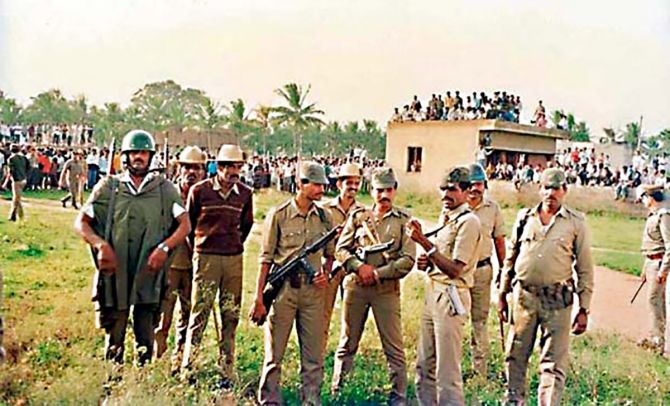
Below: Security personnel outside the building in Bangalore where Sivarasan and other LTTE terrorists were hiding as crowds gather close by.
May 21 marks 30 years since Rajiv Gandhi was assassinated in Sriperumbudur.
It is a day in infamy that will never be forgotten.
The third of a four-part interview, which was first published on Rediff.com on April 11, 1998.
The man who investigated the most sensational murder case of the 1990s, the Rajiv Gandhi assassination, Devarayapuram Ramasamy Karthikeyan spoke to Rajesh Ramachandran about the Rajiv Gandhi murder investigation.
- PART I: 'Tallest political leader was killed brutally'
- PART II: 'If Prabhakaran thinks somebody has to go, he goes'
People have been saying that you could have caught Sivarasan alive. What went wrong?
Well, we could have saved Rajiv Gandhi's life.
The assassination itself need not have taken place. The Tamils need not have gone to Sri Lanka long back.
I am telling you it is as absurd as that, because everybody knows the circumstances under which it happened.
Many people didn't believe that they were in India. I was the only one who said that they hadn't left India.
We were keeping up the chase to track them down.
We had even known the chassis number of the blue Fiat car and the Gypsy they were driving.
We had information to that extent. But we were missing them very narrowly everywhere, because they were running really fast.
Ultimately we located them. But when we located them it was in a closed house in Konnakunte.
And the information was not exclusive to us, it had gone to the local police also.
Out of sheer excitement, we can't blame them, they surrounded the house. So there was a lot of movement outside the house.
And this gentleman who had to go back didn't, as he was detained. That lady Mridula also didn't go back and this Rangan, their driver didn't return.
Rangan came, saw the crowd and went away. Suspicion was aroused.
With Mridula not coming back and the movement of the police, they were on the alert. By the time we came to know they were also alerted.
If we had alone come to know we would have taken the chance of blasting the door and going in. But our experience in earlier raids is that even if we do it instantly they are ready with the cyanide and will bite it.
There were two earlier operations in Indira Nagar, but we couldn't save the militants.
You don't know, like the pistol wielding commandos who would blast all the doors at the same time and enter there would be a doctor with a syringe, simultaneously entering, ready to prick.
We had imported anti-cyanide ampoules from Germany each costing Rs 10,000. But we couldn't save any of the militants in the earlier operations.
These are people who are anxious to die. We have not seen such type of committed people anywhere.
We are not taught about such people in the police academies anywhere in the world. We have seen people who are anxious to kill or to run away. But not so anxious to die.
It is impossible to catch such people. Unless you go behind them and catch them on the road.
All the same we tried. It was the only day I had gone to Hyderabad to attend a statutory meeting.
The moment I got the message from my officer in Bangalore I said go ahead, raid. Don't wait for me, raid immediately, because in the morning there would be a crowd and crowd means the possibility of catching them is less.
From Delhi, the then director said no, if you raid they would all commit suicide so we should plan.
He asked whether we can guarantee that we would catch them alive. How can I ask my officer, poor fellow, to give a guarantee. It is not in his hands.
Even though we have been training the commandos to shoot at the dummies only on the shoulder when they face a real situation, when they are being shot at with an AK-47, will they be looking at the shoulders?
I will silence him. So even if we had gone inside immediately our fellows would have been shot at and they would have retaliated and the accused would have been killed and then again they will say that unnecessarily the SIT sent in its commandos and got the militants killed.
But even then it would have been professionally sound to send them in. Either way it makes no difference, we need not get them alive.
You earlier talked about a precondition that you would desist from using third degree. What was the method adopted to make the hardcore LTTE militants talk?
Treating them well.
They have committed the crime, whatever their motive is, but now they are in our hands. We never hurt their human dignity.
If somebody is caught at 2 am he is brought straightaway to my room, I would be there.
The moment they come I would say, 'remove the handcuffs and the rest of you go away.'
I would get something to drink for them, coffee or tea.
I would spend an hour with them.
I would tell them that, you might have your reasons but my job is to find the truth.
I will not treat you as my enemy but I will ask questions, because that is my task. Then they used to open up.
I would confront them with facts already known to me, which they cannot rebut.
Once they know that you have found out everything then they would tell you everything.
That helped in recovering things like the wireless sets and pistols which were buried.
Then the letters were found buried in Vedaranyam. So all of these were recovered and they all added up to become convincing material proof.
My method was, talk to them painstakingly for hours together, confront each of them with intelligent interrogation, give them good food and treat them well.
They must have thought that they had done a great thing, I can understand.
Murugan (one of the accused) used to tell me, 'Sir, so and so officer slapped me today.' I would call the officer and tell him, you don't touch. It is my responsibility to the nation and the government, whether the case is detected or not.
Whenever they appeared in the court they were all looking well. The judge also used to remark, these fellows are looking better everyday. Nobody complained.
How do you react to the Jain Commission's interim report that painted the then Tamil Nadu government and the local population black?
You ask the government of the day.
I don't want to make such political statements. It has all been debated and treated with the contempt it deserves.
I wonder whether the judge had meant it.
I know Justice Jain, I don't think he meant it that way. It was a very unfortunate phrasing of the sentence.
I don't think that he meant to condemn the Tamils as a whole though I have my own differences with Justice Jain on the methodology and the timing of his comments.
In a way he prolonged the trial for a longer time and made our task more difficult, because the accused were using whatever was happening in the commission.
My request to the Commission was, 'Kindly hold the proceeding in-camera, like the Warren Commission did in the Kennedy assassination case.'
The Warren Commission was the highest-ever judicial commission appointed on this earth, headed by the sitting chief justice of the supreme court of America.
Not a one-man commission doing whatever he wanted, but consisted of six eminent members of the House of Representatives and six senators.
This commission was appointed to look into the conspiracy involved in the Kennedy assassination.
The suspect Lee Harvey Oswald, who was caught within 24 hours, was shot dead, you know the story.
So by the time the commission began its work there was no investigation or trial going on, still the commission held all the hearings in-camera, because nobody's reputation should be harmed.
The functioning of no sensitive organisation should be revealed.
I had taken the summary of the (Warren) Commission's finding and sent it to Justice Jain.
I said here such an important trial is going whose outcome would affect the prestige and the security of the country, kindly hold all your hearings in-camera.
But he didn't do it. He held all his hearings in the open and hence all wild allegations were made which delayed the trial enormously.
It was a tremendous job for us because the accused were using all that appeared in the papers on Jain Commission, cross-examining each witness on that basis.
The trial judge said sorry, you can't hold a trial when you go through the commission of enquiry.
It was a tremendous strain on me and the government was helpless because of political reasons.
So it was a pressure on me as I had to appear here, there and I had to appear before the Verma Commission.
How long was the trial delayed?
I have not calculated the hours because I have better things to do in life.
Was there any political interference during the investigation?
No. Attempts were made for their political ends, either genuine or they thought that they can use this to throw mud at their political opponents.
In our country you know everybody wants to politicise everything. Then what happens is that the larger objective of detecting the killers is gone and ultimately it is your own interest or your party's interest that is taken care of.
But then no investigator should be swayed by these things.
If you had not taken such a strong stand against the high and mighty the case would not have ended and certainly would not have ended in conviction.
Did the media carry out a parallel trial?
The media by and large played a very positive and constructive role in the investigation and even during the trial.
There was only a small section that brought disgrace to the profession by knowingly writing falsehood repeatedly.
Some of them have suffered, of course, and the court has dealt with them also.
Some of them have been highly irresponsible and vicious, they don't deserve to be journalists. They allowed reputed magazines's reputation to be spoilt.
But it was only two or three who prostituted the profession. Their false and vicious articles also delayed my trial, playing into the hands of the accused.
I don't know whether their intention was to help the accused. I don't know.
But I have always maintained that the role played by the media in the investigation is something very unique.
If and when I write my memoirs I will place it on record. It is they who mobilised the whole population with us.
On my part, I had even got a letter of displeasure telling me that I can't say everything to the media.
I said I am sorry. I am leaving. This is the way I function.
This is not one of those CBI cases which you keep going for five years and file a charge-sheet saying that so and so is absconding.
This is the killing of the most popular man at that time in the world. And everybody in the country and abroad was concerned about what was happening.
There was no way I can keep my case hidden and come out with the charge-sheet.
Who will believe me? If I don't give them the correct information they will write wrong stories, which will harm the investigation.
I said, it has to be transparent or otherwise I will go. They kept quiet after that.
This was perhaps the most transparent investigation ever done in the world.
There were so many key witnesses from the media, vital evidence came from the media. I admire their courage.
Feature Presentation: Ashish Narsale/Rediff.com

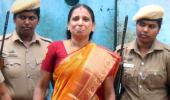
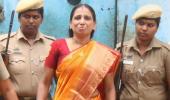
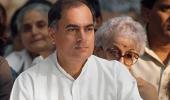

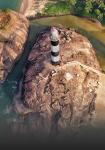



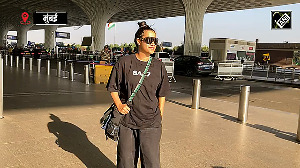
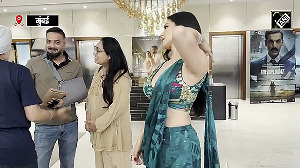
 © 2025
© 2025